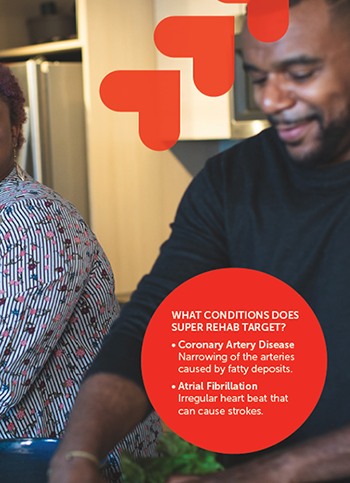Research & Development |
D1
|
Super Rehab Studies
Study 1 - Super Rehab: Can we reverse coronary artery disease?
(a feasibility study)
To prove that Super Rehab not only works, but should be offered to patients with early forms of coronary heart disease on the NHS up and down the country, we will need a trial in multiple centres across the UK.

As a first step to achieving this, we have recently won the support of the National Institute for Health Research to run a study testing the feasibility of delivering Super Rehab to this important patient group, and testing trial procedures. This will allow us to not only improve the way that Super Rehab is delivered to our patients and how it fits into the working patterns of our colleagues delivering it, but will help check that study procedures and tests are manageable and give us some initial pilot data into the sorts of impact Super Rehab may have on coronary heart disease.
The study will include 50 participants randomised to either Super Rehab or to continue with normal care only. Participants in the study will all have imaging tests of their heart and blood vessels, blood tests, blood pressure checks and fitness checks at the start, middle and end of their involvement in the study.
We’ll also take the opportunity at the end to interview patients who went through the Super Rehab programme to find out more about their experience and highlight any areas for improvement. As well as the potential benefits we believe patients involved in the study will gain, the valuable information gained from this study will support the design and delivery of a future multi-centre study testing Super Rehab in patients across the country.

Study 2 - Super Rehab: A novel approach to reverse atrial fibrillation?
As the most common rhythm disturbance as well as the most common cause of strokes in the UK, atrial fibrillation is a major problem for many patients up and down the country. There are various medications and procedures available to try and combat the symptoms it causes and reduce patient's risk of stroke. However, other evidence has shown that weight loss and improved fitness levels can have profound effects on atrial fibrillation, reducing the need for these medications and invasive procedures.This study will randomise just under 40 patients to Super Rehab or to continue with normal care only.
Participants in the study will all have heart monitors, imaging and bloods tests, blood pressure checks and fitness checks at the start, middle and end of their involvement in the study.
Importantly, we will be testing the impact of Super Rehab on patient’s symptoms, which can be very unpleasant for patients with AF, as well as using new sensitive ways to track changes in an individual’s risk of a future stroke.

